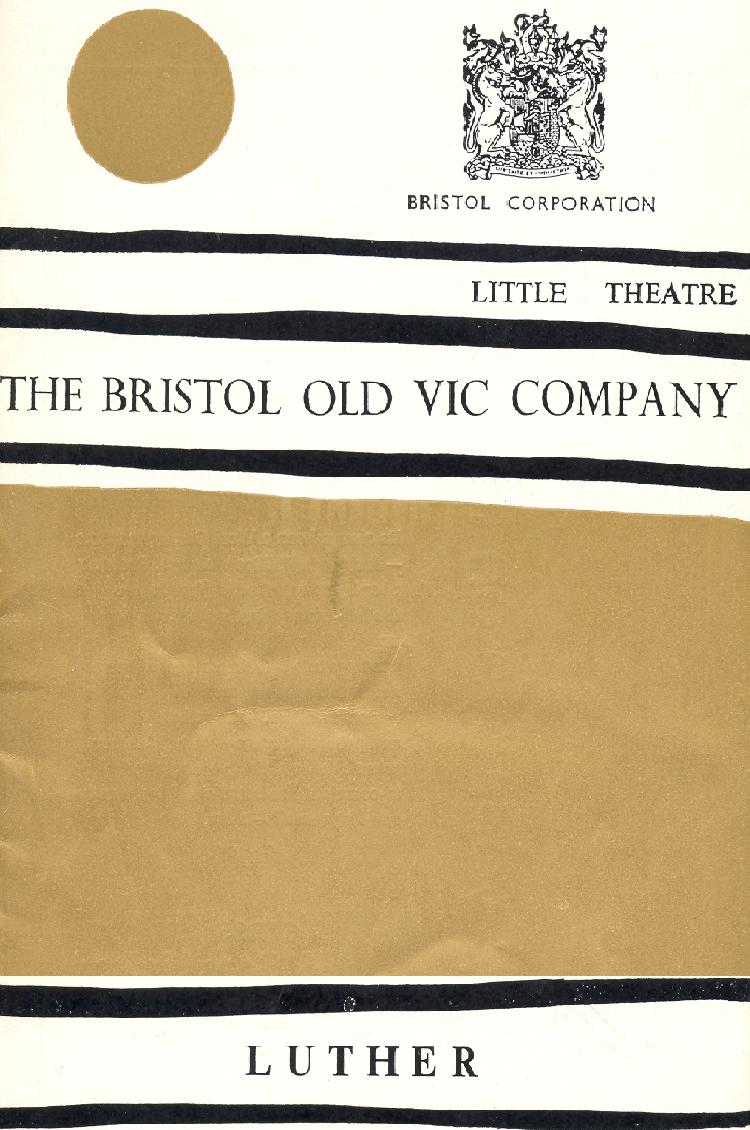|
|
L U T H E R BY JOHN OSBORNE DIRECTED BY THE BRISTOL OLD VIC COMPANY L I T T L E T H E A T R
E OCTOBER 1st -- 22nd 1968 |
|
~~~~~~~~~~~~~~~~~~~~~~~~~~~~~~~~~~~~ |
|
|
T H E C A S T |
|
|
MARTIN
LUTHER…. |
JOHN CASTLE |
|
~~~~~~~~~~~~~~~~~~~~~~~~~~~~~~~~~~~~ |
|
|
SYNOPSIS The eloquent and searing chronicle of
Luther’s struggles with his conscience and his Church and his search to two
fathers, one on earth and one in heaven.
It may also be seen as a parable of modern M A R T I N L U T H E R |
|
|
1483 |
Born into a strict and pious mining family in Eisleben in |
|
1501 |
Became a student at |
|
1505 |
January graduated Master of Arts May took up Law to please his father. July 2nd. Prostrated by a flash of lightning in a thunderstorm Luther vowed to St. Anne to become a monk if she saved him. July 17th.
Entered the Augustinian cloister at |
|
1507 |
Celebrated his first Mass |
|
1508-9 |
Lectured for one semester at the Monastery of Wittenberg, where his brilliant command of theology was admired by John Staupitz, Vicar-General of the Order. |
|
1511 |
At the insistence of Staupitz, Luther was transferred to |
|
1512-13 |
His obsessive doubts about salvation gave birth to his most important concept; that man is not saved by good deeds, but by faith in God. It was a revolutionary doctrine, but he still considered himself to be orthodox. |
|
1517 |
Emerged as a practical reformer by preaching against the system of indulgences. October 31st nailed to the Church door at |
|
1518 |
Spring accused of heresy and schism, Luther wrote a
defense to the Pope. He was summoned
to |
|
1520 |
Spring the Pope issued a Bull of Condemnation against Luther and his followers, giving them sixty days to retract. Luther burned this publicly. December wrote his three great Reform Treatises, attacking abuse in the Church and appealing to secular powers to undertake the business of Reform; suggesting three instead of seven Sacraments, and asserted the freedom of the individual conscience. |
|
1521 |
January the Pope launched a Bull of Excommunication; this the Emperor Charles did not immediately carry out,
but called Martin to the Imperial Diet at |
|
1522 |
March popular support for Luther increased. Luther came out of hiding and continued his controversial writing, proposing, for example, the marriage of the clergy, and drawing up a reformed Communion Service. Meanwhile the democratic and nationalist implications of his teaching were being seized upon and transmitted to the discontented mass of people. |
|
1525 |
Spring the peasants of Married an ex-nun. |
|
1526 |
His first son born. Two other sons and two daughters were to follow. |
|
1525-46 |
Composed hymns, translated the Old Testament, issued innumerable pamphlets, engaged in controversy with other reformers, and worked ceaselessly to maintain the movement he had started. |
|
1546 |
Died at Eisleben, where he was born. |
|
|
|
|
|
|
Part of
the... |

